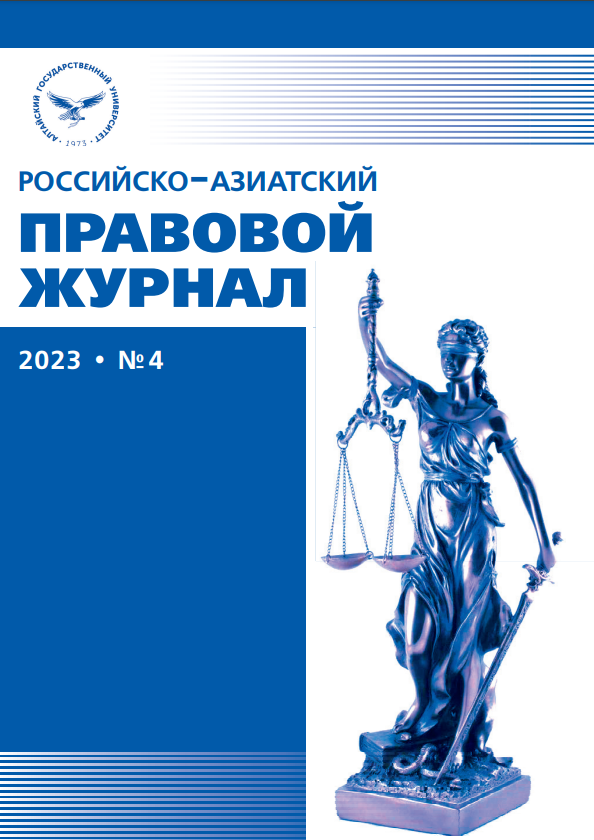MODEL LEGISLATION OF THE CIS MEMBER STATES ON JURY TRIALS
УДК 343.161.1 ББК 67.711.48
Abstract
The article considers the issue of inter-parliamentary cooperation of the member states of theCommonwealth of Independent States (CIS), formed in 1991. The main form of inter-parliamentarycooperation of the member states of the Commonwealth of Independent States is model lawmaking. As aresult of a comparative legal study, it was concluded that the model legislation of the Commonwealth ofIndependent States and the national legislation of the CIS member states, in particular the legislation ontrial with the participation of jurors, are interrelated and mutually influenced. The subject of the study wasthe norms of the “Model Criminal Procedure Code for the CIS Member States” in 1996 and the norms ofthe “Model Code on the Judicial System and the Status of Judges for the CIS Member States” in 2011. Thegeneral tendency to improve the judicial systems of the Russian Federation, the Republic of Kazakhstan, theKyrgyz Republic was revealed — the legislative consolidation of the possibility of considering criminal casesby a court with the participation of jurors. In the Russian Federation and the Republic of Kazakhstan, thecourt with the participation of jurors is successfully functioning, in the Kyrgyz Republic it will be introducedin January 2025.
Downloads
References
Устав Содружества Независимых Государств: принят решением Совета глав государств в г. Минске 22.01.1993 г. // Единый реестр правовых актов и других документов СНГ. URL: https://cis.minsk.by/reestrv2/doc/187#text
Положение о разработке модельных законодательных актов и рекомендаций Межпарламентской Ассамблеи государств — участников Содружества Независимых Государств: принято Межпар-ламентской Ассамблеей государств — участников СНГ 14.04.2005 г. // Единый реестр правовых актов и других документов СНГ. URL:https://cis.minsk.by/reestrv2/doc/3121#text
Межпарламентская Ассамблея СНГ (1992–2022) // База документов. Список модельных кодексов и законов. URL: https://iacis.ru/baza_dokumentov/modelnie_zakonodatelnie_akti_i_rekomendatcii_mpa_sng/modelnie_kodeksi_i_zakoni
Модельный уголовно-процессуальный кодекс для государств — участников Содружества Независимых Государств: принят 17.02.1996 г. Постановлением №7–6 Межпарламентской Ассамблеи государств — участников СНГ // Приложение к Информационному бюллетеню. 1996. №10 // Единый реестр правовых актов и других документов СНГ. URL: https://cis.minsk.by/reestrv2/doc/548#text.
Модельный кодекс о судоустройстве и статусе судей для государств — участников СНГ: принят 16 мая 2011 г. Постановлением №36–12 Межпарламентской Ассамблеей СНГ // Информационный бюллетень Межпарламентской Ассамблеи государств — участников СНГ. 2011. №51 // Единый реестр правовых актов и других документов СНГ. URL: https://cis.minsk.by/reestrv2/doc/3059#text
Уголовно-процессуальный кодекс Российской Федерации от 18.12.2001 г. №174-ФЗ // СПС КонсультантПлюс.
Уголовно-процессуальный кодекс Республики Казахстан от 04.06.2014 г. №231-V ЗРК. URL: https://online.zakon.kz/Document/?doc_id=31575852&pos=3445
Уголовно-процессуальный кодекс Кыргызской Республики от 28.10.2021 г. №129. URL: http://cbd.minjust.gov.kg/act/view/ru-ru/112308
Russian-Asian Law Journal is a golden publisher, as we allow self-archiving, but most importantly we are fully transparent about your rights.
Authors may present and discuss their findings ahead of publication: at scientific conferences, on preprint servers, in public databases, and in blogs, wikis, tweets, and other informal communication channels.
Russian-Asian Law Journal allows authors to deposit manuscripts (currently under review or those for intended submission) in non-commercial, pre-print servers such as ArXiv.
Authors who publish with this journal agree to the following terms:
- Authors retain copyright and grant the journal right of first publication with the work simultaneously licensed under a Creative Commons Attribution License that allows others to share the work with an acknowledgement of the work's authorship and initial publication in this journal.
- Authors are able to enter into separate, additional contractual arrangements for the non-exclusive distribution of the journal's published version of the work (e.g., post it to an institutional repository or publish it in a book), with an acknowledgement of its initial publication in this journal.
- Authors are permitted and encouraged to post their work online (e.g., in institutional repositories or on their website) prior to and during the submission process, as it can lead to productive exchanges, as well as earlier and greater citation of published work (See The Effect of Open Access).








